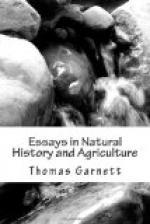On one point, about which there is great difference of opinion, viz. whether the fish which are bred in the river generally resort to it again, and whether each river has its own variety of fish, I am not a competent judge, as I am acquainted with too few rivers to pretend to decide. I may, however, just remark that the Hodder, though it is a much smaller river than the Ribble, is always much better stocked with Salmon, Morts, Sprods, Smolts, and Par than is the latter river, which I attribute to the fact that more fish spawn in the river Hodder, which runs for many miles through the Forest of Bowland (the property of the Duke of Buccleuch) and other large estates, and the fish are much better protected there than in the Ribble, where, with one or two exceptions, the properties are very much divided, and few people think it worth their while to trouble themselves on the subject. Dr. Fleming, in his letter to Mr. Kennedy (Appendix to the first Rep., 1825), seems to doubt that Salmon enter rivers for any other purpose than of propagation, but lest I should misrepresent his opinions, I will quote what he has said on the subject:—“In the evidence taken before the Select Committee during the last season of Parliament, and appearing in the report, there are several statements of a somewhat imposing kind, which, as they appear to me to be erroneous and apt to mislead, I shall here take the liberty of opposing.” He then enumerates several opinions expressed before the Select Committee, one of which is, that Salmon enter and leave rivers for other purposes than those connected with spawning (see the evidence of Messrs. Little, Halliday, and Johnstone).




